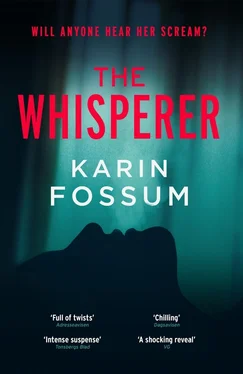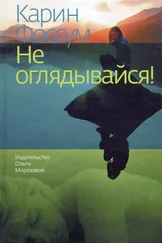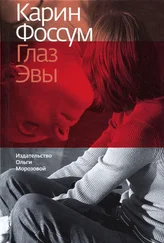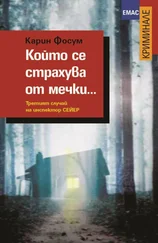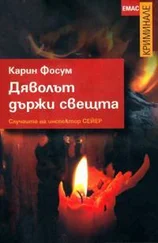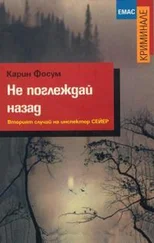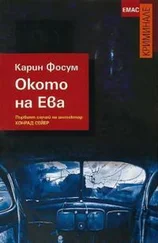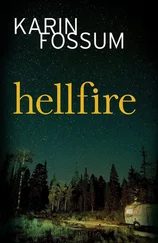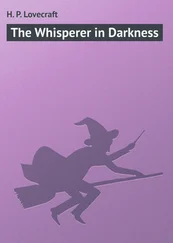‘What about the boy?’ he asked carefully.
Ragna clutched her handbag. She did not understand what he meant. The boy? Did he mean Rikard Josef? Practically no one knew she had a son, certainly not the customers at Europris, and she did not spend much time with other people. She dismissed him with a disconcerted shrug and hurried down the street towards the square, without turning round. The bus was standing at its stop, engine running, thank goodness, warm and bright, so she got on and walked down the aisle. Her seat was empty. Now that she was in the light, the city outside was dark and she could no longer see him. All she saw was a reflection of her own face. The rain on the glass erased her features, as though her face was running down the window. The boy, he had said. The boy. With that strange, slightly embarrassed smile.
The bus quickly filled. People were pushed together. A teenager plonked down on the seat beside her, and the proximity of a young body made her shrink back to take as little space as possible. She looked down the street one last time, at the umbrellas and illuminated shop windows. Walther, she thought, taken aback. Walther Eriksson. She had forgotten all the years that had passed. He was an elderly gentleman now. The tooth of time had worn him. He had asked about his son and she had not answered. What if he had moved back to town, what if she met him again? What if he asked for his son’s address? The one she no longer had.
She fretted all the way home. He was another sign, a warning, a change. She had accepted things as they were. Now that was being disturbed. They were all in cahoots, spreading like rings on the water. You are going to die, Ragna, and it is not long now.
There was a catalogue for ladies’ clothes from Wentz in the mailbox, and the newspaper. No threats, no one nearby when she looked over her shoulder. The lights were on in Irfan’s shop, and in her house.
Was it really Walther Eriksson? That jowly, old man, unkempt and badly dressed — was it really him? She was no longer certain, back in the safety of her own house. What had become of the strapping man she once met, so tall and confident and courteous — the master photographer himself? Who had walked quietly across the floor, through a whirlwind of girls, and chosen to sit on the arm of her chair. Why? She was the youngest, thinnest and palest of them all. What had he hoped to achieve? And what should she think now, after all these years? How many girls had he photographed? Only the youngest, the ugliest, the ones with the least confidence, who allowed themselves to be seduced by his camera and big lens? The wine he had poured was sweet, on purpose, perhaps — no adult would drink Peach Canei. How many children did he have? Why was she questioning his motives at all, when she had reconciled herself with her fate a long time ago, when she had seen him as a blessing for so many years? He had given her a son. Her cheeks were burning, they were burning because she realised she was wrong, and that he was just like every other man, out to get his own way. She blushed because he had seen her at close hand today, after so many years, in the badly lit cafe; he had seen that she was not beautiful, even though he may once have thought so and caught what he saw on his camera. He had given her the photograph and she had believed what he told her. He must have been incredibly disappointed today. She had faded, every year had drained her of colour. But now he had decided to come crawling. He had asked about the boy. He did not even know his son’s name, all he knew was that he had a boy. She had sent him a card after the birth, to which he never replied. No congratulations, no good luck, no thinking of you. And now, for some reason, he had come back and had somehow managed to find her. Or was it a coincidence? It had to be a coincidence. Or had his past caught up with him — was he also seeing signs everywhere? She let go of the bags in her hands, and stood in front of the mirror by the front door. Stood there in her coat. Did exactly what he had warned her not to do, and as the seconds passed, she realised she was disappearing. The older she got, the more colour she would lose. What if he came to her house this evening, with some kind of credible story, that he was visiting old stamping grounds and just wanted to say hello? That he had thought about her for all these years and wanted to know more about his son, who he had of course never forgotten. Who he had always wanted to meet, but had never found the time. Her thoughts turned nasty, her eyes narrowed. Presumably he had lost everything he had in Stockholm, his wife, children and career. And teenage girls were no longer so easy to seduce. That was why he had come back. He wanted to give it a second try, wanted to stand at her door with his hands open, his eyes begging — could he not come into the warmth, only for a moment, all he wanted was something to take with him. Some photographs, some stories about the boy.
She turned her back on her reflection and opened the front door. The only thing on the front step was a broom that she used for sweeping off the snow and autumn leaves. The wood stack was behind the house, under a green tarpaulin. She went round and got a couple of logs, held them under her arm as she wrestled the tarpaulin back into place. Once indoors again, she put the logs in the burner with some kindling. Then sat down on the floor and lost herself in the flames that she could see through the glass. Walther must have noticed that she did not recognise him. Or at least that she was uncertain. He had probably pulled his coat tighter around him and wandered the cold, wet streets, thinking about his life, or cursing it. Or perhaps he had stormed off because she had rejected him. Lonely and forgotten in his own town. Maybe he had found his way to the pub to drink away his sorrows. In his mind, he was back at the party, sitting on the arm of her chair, with his big camera bag on the floor — the weapon that got him what he wanted, especially when it came to girls. In front of the camera they became shy. In front of the camera they felt seen. The fire was burning well now, and her cheeks were hot again, only this time not from shame, but the heat of the dancing flames. The boy had done well, hadn’t he? Senior management in a luxury hotel in Berlin. While all she did was put rubbish out on the shelves in Europris. She was glad he did not know about that. Or perhaps he had been there without her knowing.
For the second time, she pulled herself out of a reverie and went into the bedroom. The old glass light fitting, full of dead flies, brought to mind a pale moon. She pulled open the bottom drawer of the chest. The photograph was in a yellow envelope, which she opened carefully. She took the photograph out and carried it back into the living room where the light was better. Sat down on her favourite chair, pulled the reading lamp closer and held up the picture. It was big, about A4, she thought. There was something fairy-like about the image. She looked as transparent as porcelain, with downturned eyes. He had not included her body, there was no beauty there. She had never been shapely, or charming or confident. It must have been her childish, or rather, angelic voice, which she had now lost. He had once said that when she spoke and laughed it sounded like the tinkling of bells. There’s no malice in you, little Ragna.
She did not sleep well that night. She felt like she had been caught. But she refused to get worked up about it. If she lay there without moving, she would eventually fall asleep. Perhaps Walther was lying awake somewhere, equally at a loss, his body tired and worn. He had followed her out of the cafe, which must have taken great courage. And he had identified himself, in his own modest way, and she had rejected him. She had looked at him as though he were a stranger and run away. Perhaps he thought that she was bitter, and that she would never say another word to him. Whatever the case, he could find out for himself about ‘the boy’. But she had no regrets. Despite the fact that he had plied her with drink, carried her to a bedroom, and taken advantage of her as he whispered to her and stroked her as though she were a kitten. She decided she would go into town and look for him. But then she would have to reveal her handicap. And he would discover that the bells were no longer there, and that the boy had left, and vanished into thin air.
Читать дальше
